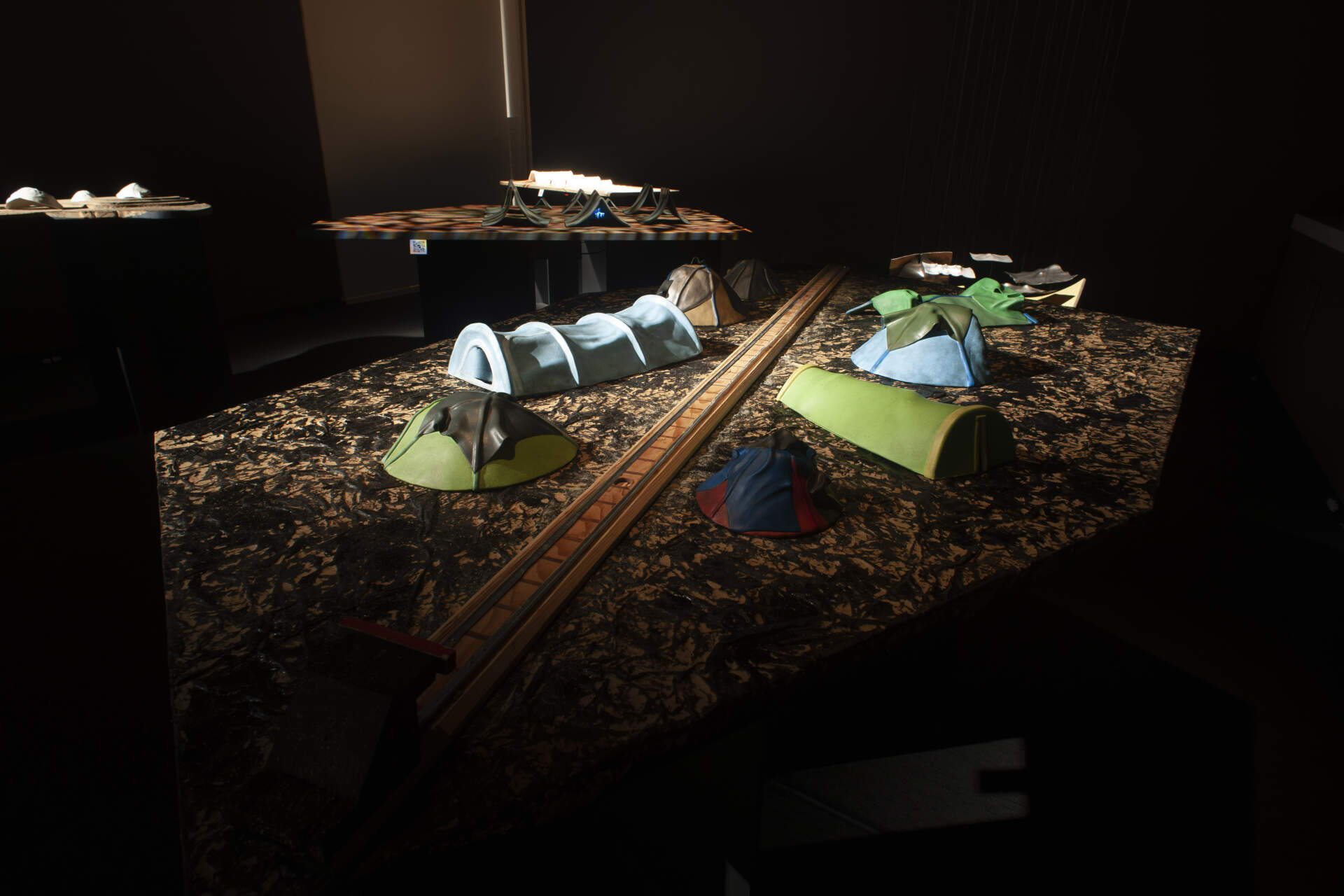Lisa Karrer (b. 1957)SHELTER Station 2
2020
Courtesy of the artist
Station 2 Ceramic Forms: Middle Eastern refugees fleeing to Eastern Europe are often caught between borders, unable to go forward or return the way they came, living for months in flimsy pup tents along filthy railroad tracks.
Station 2 Video Scenarios: https://vimeo.com/507696411
Featuring: Gerald Ramsey, Al Monaco, Aqueira Oshun, Abdula, Fayeka and Maryam Abdulghafar.
Mwangaza (Wife of Watimbwa)
Democratic Republic of Congo / Language: Swahili
I am from Congo. I was born in Congo, Bukavu. I want to talk about how I came to leave Bukavu.
One night we went to visit our cousin. It had been a long time since we had seen them. We ate and talked and laughed. Then we went back home. In the morning we were getting ready to go to school. My parents were getting ready for their day.
I went to school. I was in the classroom with the other kids and the teachers. Then we heard gunshots and we didn’t know what was going on. The teacher told us to run, to save our own lives.
When we were running our parents came and met us and took us and ran with us. I saw my mother and my father and my older sister and my other siblings. They all came to get me because we needed to run, because the war had started. I asked my mother, “What is going on?” She said “The war is starting. Don’t ask too many questions because we just have to run!”
As we were running we saw people laying down dead. There were other people wounded. When we were running we saw a big group of people also running. Everyone was running. “Where are we going?” “We don’t need to know. We need to see where we can go to save our lives!” When we were running and we saw dead or wounded people we didn’t even care. We just had to keep running to save our lives. That is how we got to Kenya and lived as refugees.
**Please note: Mwangaza’s English narrative continues at Station #6
Watimbwa (Husband of Mwangaza)
Democratic Republic of Congo / Language: Swahili and English
Speaking in English, Watimbwa tells his story of leaving Congo, and the many places he had to shelter before finding his way to Buffalo.
**Please note: Watimbwa’s narratives continue at Station #2 and Station #6
Yajaira (Wife of Oscar)
Colombia / Language: Spanish
When I interviewed Yajaira and her husband Oscar, they were in the process of establishing their status as asylum seekers.
At home, everyone used to get together during Christmas. It was the custom to make the food outside, because we do parties outside there, in the streets. You get together with your neighbor and the neighbor brings over food and shares it with the other neighbor and that’s really comforting. When you wake up during a period of festivities, like Christmas, you can eat the traditional food. For example in the Guajira we are used to eating Chivo, in Guajira it’s the Chivo, we’re also known to love a lot of seafood.
I miss my mom, back home. We told everything to each other and we were very intimate and I miss that. My siblings, I miss them a lot as well, it always feels hard to not be able to go back, and it’s also hard to leave everything behind without ever knowing when you can come back home. But, I feel safe here and Colombia is…no matter what happens, you never forget the good part of home. And I’m proud of the Colombia I remember. And I feel happy and safe because God gave me the opportunity to be born in that country.
Another thing I liked to do after I was already married was when I’d go visit home. I miss my mom’s food. It’s totally different here, but one gets used to it. But the food is what you miss, the family, the people, it’s really hard and complicated, and it’s really easy to imagine how nice it would be to be back home with family. My dad passed away, and I couldn’t go back to see him one last time because I was in a city really far away, and I had just given birth and we were already going through some really hard times. It was painful and it broke my spirit to not be able to see him when he passed away. But deep in my heart, I know that he understood and he will understand that it wasn’t that I didn’t want to go, it was that I couldn’t. And the last thing I miss…it is my brothers and sisters. It is one of the things I miss the most of my family.
**Please note: Yajaira’s narrative continues at Station #8
